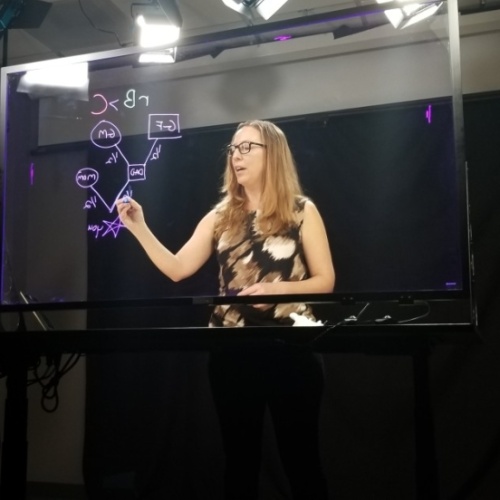News & Events
Precollege faculty spotlight: Dr. Abby Drake

SCE News, April 11, 2024
Before COVID forced Cornell’s academics online in 2020, Abby Drake, senior lecturer in Ecology and Evolutionary Biology, had been working with Cornell’s Center for Teaching Innovation (CTI) to develop an active-learning based online version of a biology course she was co-teaching. The work on that course, BIOEE 1781: Introduction to Evolution and Diversity, became an important model that helped CTI prepare rigorous online curriculum that emphasized scalability and effective student learning during the pandemic.
This groundbreaking course is available not only to undergraduates this summer, but also to high school students through the Precollege Studies program offered by the Cornell’s School of Continuing Education and Summer Sessions (SCE).
The four-credit, online course, which runs June 24-August 2, explores topics the genetics and developmental basis of evolutionary change, evolution by natural selection, modes of speciation, long-term trends in evolution and the origin of humans.
Huitong Xu, a high school student who took BIOEE1781 during Summer Session from China last year, said, “The team-based learning approach made my learning journey more effective as an international student. Cornell is my dream university, and I was interested in biology and life science taught there. The course helped me explore my academic passion and deepen my understanding of evolution.”
SCE asked Dr. Drake, who recently won CTI’s Innovative Teaching and Learning Award, what Precollege students can expect from taking the class, which will be offered again to high school students next spring and during Summer Session.
What should high school students know about taking BIOEE 1781: Introduction to Evolution and Diversity online?
We designed this course to specifically support students in an online environment by using a unique pedagogical approach called Team-Based Learning. One reason students can fall behind in an online course is that it can feel like they are not part of a classroom or community. To create a feeling of community and camaraderie I place the students on a team with a few other students. After everyone has completed their asynchronous, individual lectures for the week, the team meets together online to complete some team assignments each week. This gives the students an opportunity to get to know other people in the class and learn from each other. It also helps to motivate them to keep up with their individual assignments each week because they feel responsible to their teammates. Students in the course often tell me how much they really enjoyed working with their teammates.
What is the ideal student for this course?
Having at least one biology course in high school is very helpful. Other than that, students that are inquisitive and open to learning about life on this planet and the forces that shape it will find this course rewarding. Being organized and keeping to a schedule is very important to success.
What’s it like to teach an online course where there are motivated high school students in class?
It’s very rewarding to work with high school students in this course. They are highly enthusiastic and engaged. They’re genuinely curious about evolution and the organisms that we discuss. They’re a real joy to teach.
What are the things that you enjoy teaching in this course to undergrads and high school students?
One of my favorite parts of the course is teaching the Tree of Life and how all organisms have evolved from a single common ancestor. We explore everything from disease-causing organisms like viruses, bacteria, and protists to plants, fungi, and of course, interesting animals. It can be profound to learn how life has unfolded on this planet and how all of life is related. We also talk about some important aspects of evolution such natural selection and how important this is in understanding how diseases evolve.
What do you hope your students come away with by the end of the course?
I hope that the students come away with a new appreciation of how they are connected to and related to all of the life around them and how evolutionary forces have shaped this life. Also, an understanding of how evolution continues to act especially as humans modify the planet in extreme ways.
For more information about this and other Precollege Studies programs, such as the application process, deadlines, cost, and other information, visit SCE’s Precollege Studies website.



